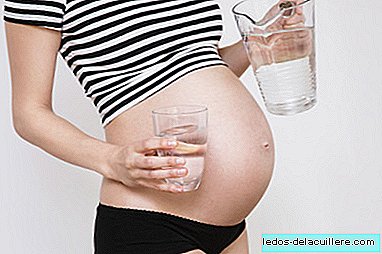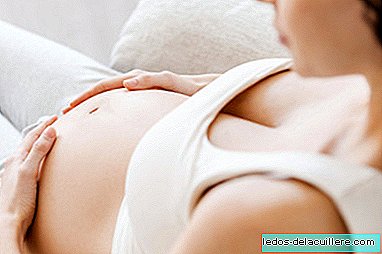
During pregnancy, our thirst threshold increases and we have to drink more. The liquid needs in the gestation period go from about two liters per day (about eight glasses) to 2.7 liters (about ten glasses per day). Of course, that liquid cannot be any, but we talk mainly about water. The sparkling water is adequate if we do not have digestive discomfort, and avoiding those that have a high sodium content.
The Spanish Society of Gynecology and Obstetrics (SEGO) has a consensus document on “Hydration guidelines with drinks with mineral salts for pregnant and breastfeeding women” and among his advice is to drink liquids at small intervals to prevent heartburn and nausea during pregnancy. Although this is not the only advantage of drinking water during pregnancy.
Since water has no calories, it does not influence fat gain (although it does affect weight, since up to two thirds of the total weight gain during pregnancy is due to water) and helps us maintain the ideal weight in pregnancy.
In addition to preventing constipation or fluid retention, as we will see below, the water provides good hydration for the whole body, including the skin, which is going to stretch so much in certain areas, with the consequent prevention of the risk of stretch marks.
As to beverages with mineral salts in pregnancy, with sodium and with quick absorption sugars, experts point out that they can facilitate better rehydration, although we must bear in mind that if they carry gas they can affect discomforts such as gases and a high sodium content could favor the appearance of enema or hypertension
But we don't just stay in liquids. Certain foods with a high percentage of water, such as fruits and vegetables, can help maintain a good level of hydration, helping to facilitate intestinal transit and prevent constipation.

The Consensus Document on hydration guidelines mentioned above includes the following specific considerations:
- Water facilitates the flow of nutrients into the bloodstream of the fetus and its distribution throughout the body.
- Constipation is a common problem during pregnancy, but the situation can get worse if the woman does not drink enough fluids to help prevent it.
- Drinking liquids at small intervals will help prevent heartburn created by gastric juices and nausea.
- The increase in liquid intake helps increase the amount of urine, which helps to purify the body of toxins, and reduces the incidence of kidney stones and urinary tract infections, which are more frequent in pregnant women. In addition, it is important for the pregnant woman to urinate frequently to avoid such infections.
- Water and other drinks help prevent dehydration which, if it occurs during pregnancy, can be dangerous, causing headaches, nausea and even contractions in the third trimester.
- The nursing mother should increase her fluid intake and needs to meet fluid requirements without restrictions. In this situation, the feeling of thirst increases.
- In hyperemesis or acute gastroenteritis there is a great loss of mineral salts from vomiting or diarrheal feces respectively. Drinks with mineral salts help ensure an optimal level of hydration and have a beneficial effect on these typical pregnancy pathologies. In addition to their pleasant taste they are usually well tolerated and appetizing.
Finally, remember that during pregnancy it is recommended to drink periodically, even before being thirsty, which is the first sign of dehydration. In addition, special care must be taken to drink enough liquid when we exercise and in summer. In breastfeeding, fluid needs also increase, so don't forget to drink enough water when you already have your baby.












